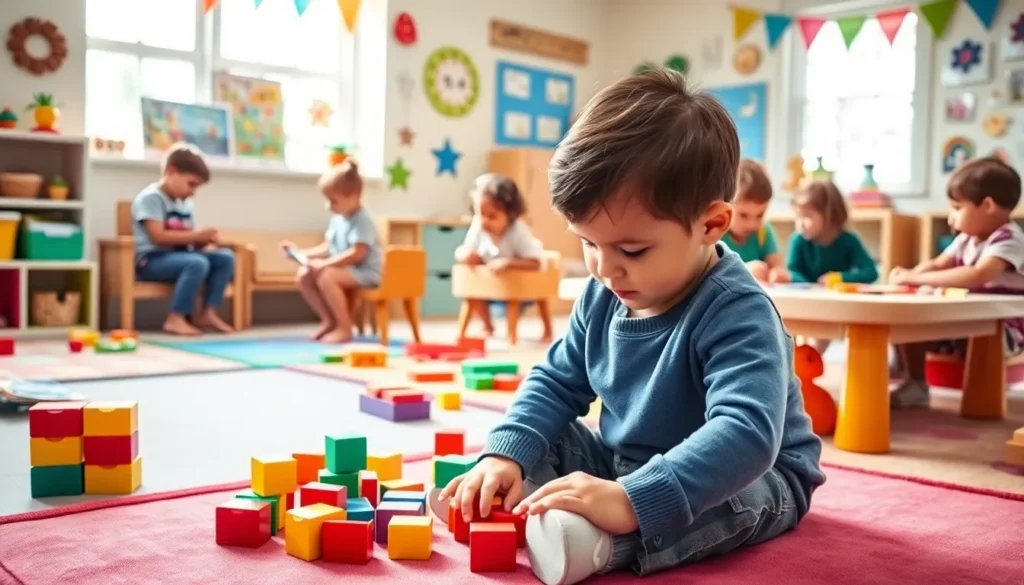Foster families are the unsung heroes of our society, stepping in when life throws curveballs at children in need. Imagine opening your home and heart to a child who just needs a little extra love and support. It’s like being a superhero, minus the cape—though capes are optional if you’re feeling fancy!
These families provide a safe haven, guiding kids through life’s ups and downs while creating bonds that can last a lifetime. Whether it’s sharing a laugh over dinner or tackling homework together, foster families make a world of difference. So, if you’ve ever thought about making an impact, fostering could be your chance to shine. After all, who wouldn’t want to be part of a story that’s all about love, growth, and a sprinkle of chaos?
Table of Contents
ToggleUnderstanding Foster Families
Foster families play an essential role in the lives of children needing stability and care. These families provide a nurturing environment that supports emotional and physical growth.
Definition of Foster Family
A foster family consists of individuals who provide temporary care for children removed from their biological families due to various reasons, such as abuse or neglect. Foster caregivers offer love, structure, and guidance during a crucial time in a child’s life. While fostering is temporary, the impact can last a lifetime, leaving children with a sense of belonging and hope.
Types of Foster Care
Multiple types of foster care exist, each addressing unique needs.
- Emergency Foster Care: This serves children in crisis situations where immediate placement is necessary.
- Short-term Foster Care: This provides temporary homes for children awaiting reunification with their biological families.
- Long-term Foster Care: This offers stability for children needing care for an extended period.
- Respite Foster Care: This gives relief to regular foster families, caring for children for brief periods.
Each type serves a specific purpose, contributing to a child’s overall well-being and future success.
The Importance of Foster Care

Foster care plays a crucial role in nurturing vulnerable children. It provides stability and support during challenging times.
Impact on Children
Foster care profoundly affects children’s emotional and psychological development. Stability in a foster home reduces anxiety, promoting healthier behaviors. Strong relationships with foster parents can enhance self-esteem and resilience. Children in foster care often experience improved educational outcomes, setting a foundation for future success. Supportive environments enable them to develop essential life skills. Children gain the opportunity to heal from past trauma while learning to trust again.
Societal Benefits
Foster care contributes significantly to community health and safety. It reduces the risks associated with children remaining in harmful environments. Protecting children through foster care lessens the burden on social services. Communities benefit from foster families who offer love and support, fostering a sense of belonging for children. Long-term, successful placements lead to healthier adults, ultimately reducing crime rates and welfare dependency. Communities that embrace foster care build a supportive network, enhancing overall societal well-being.
Challenges Faced by Foster Families
Foster families encounter various challenges that can impact their ability to support children effectively. Understanding these obstacles helps in addressing them more constructively.
Emotional and Psychological Strain
Emotional and psychological strain often affects foster families. Caregivers frequently manage trauma-related behaviors exhibited by children. Many children come from backgrounds filled with instability and loss, generating stress for both the child and the foster parents. Maintaining emotional stability is crucial for both parties. Over time, exhaustion may set in if these challenges go unaddressed. Some foster parents experience feelings of inadequacy or frustration when progress seems slow. Support groups and counseling can offer valuable outlets for these emotions, fostering resilience. Building strong connections between caregivers and children promotes healing and stability for all involved.
Financial Considerations
Financial considerations pose significant challenges for foster families. Many families face unexpected expenses related to children’s needs, including medical care, therapy, and educational support. Foster care reimbursement often does not fully cover these costs, leaving families to bridge the gap. Balancing work and family obligations strains budgets further, as care responsibilities can be demanding. Various resources exist to assist families, such as nonprofit organizations and government programs. Connecting with local support systems can provide crucial financial relief. Resource management is essential in navigating the complexities of fostering and ensuring a stable environment for children.
Support Systems for Foster Families
Foster families benefit greatly from various support systems that enhance their caregiving experience. These resources provide critical assistance in navigating the challenges of fostering children.
Government Assistance
Government programs offer crucial financial assistance to foster families. Monthly stipends cover basic needs, including food, clothing, and educational expenses. Each state has different reimbursement rates, which can vary based on the child’s age and specific needs. Additional benefits like medical coverage under Medicaid ensure access to healthcare services. Training programs funded by state agencies help foster families develop skills necessary for managing trauma-related behaviors. Understanding these options aids in reducing financial strain, ensuring a more stable environment.
Community Resources
Community resources play a significant role in supporting foster families. Local organizations often provide counseling services, connecting families with professional therapists who specialize in trauma. Support groups for foster parents foster a sense of camaraderie, enabling shared experiences and solutions. Educational workshops cover topics such as behavior management and parenting techniques tailored for children from difficult backgrounds. Many communities also offer recreational programs, which help foster children engage with peers. Accessing these resources significantly enhances the overall well-being of both foster parents and children.
Personal Stories from Foster Families
Foster families often share inspiring experiences that highlight their impact on children’s lives. These narratives reflect resilience, growth, and the power of love in fostering connections.
Success Stories
Many foster families celebrate remarkable achievements among the children they care for. One family welcomed a teenage girl who struggled academically and emotionally. With unwavering support, she graduated high school and received a scholarship for college. Another foster family transformed a young boy’s life; they nurtured his passion for art, leading him to earn recognition in local exhibitions. Each story emphasizes how love, stability, and encouragement foster success in children.
Overcoming Adversities
Challenges often accompany the journey of foster families. One mother recounted her struggle with a child’s behavior that stemmed from trauma. Through persistent effort and community support, they built trust and understanding, resulting in significant improvement. Another foster parent faced financial hurdles while welcoming siblings who needed care. By connecting with resources and local networks, she managed these challenges effectively. These stories reflect the determination of foster families to navigate adversities while prioritizing the well-being of the children they serve.
Foster families play an essential role in shaping the lives of vulnerable children. By providing a nurturing environment and unwavering support, they help these children overcome challenges and build brighter futures. The journey of fostering is filled with both triumphs and trials, but the rewards of seeing a child thrive are immeasurable.
As society continues to recognize the importance of foster care, the need for compassionate families remains critical. Those considering this path can find fulfillment in making a lasting difference. With the right resources and support, foster families can navigate the complexities of caregiving while fostering resilience and hope in the children they serve.




